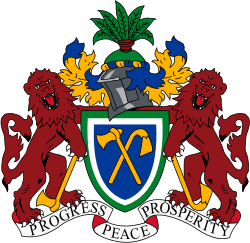Gambian parliamentary election, 2012
| | ||||||||||||||||||||||||||||||||||||||
| ||||||||||||||||||||||||||||||||||||||
| ||||||||||||||||||||||||||||||||||||||
 |
| This article is part of a series on the politics and government of the Gambia |
| Constitution |
|
Legislative
|
|
A parliamentary election was held in the Gambia on 29 March 2012.[1] The election was for 48 of 53 seats in the unicameral National Assembly, with five seats being appointed by the president.
Background
In the past, President Yahya Jammeh has said that regions that do not vote for him would be isolated. This has helped him garner more votes.[2]
Method
Due to the over 50% illiteracy rate in the country,[3] voters would drop glass marbles into coloured drums based on the candidate they chose. Upon the marble hitting the bottom of each drum, a bell would sound to prevent voter fraud through multiple voting.[2]
Boycott
Six opposition parties (United Democratic Party (UDP), People's Progressive Party, People's Democratic Organisation for Independence and Socialism, National Democratic Action Movement, Gambia Moral Congress, Gambia Party for Democracy and Progress, National Convention Party and the National Alliance for Democracy and Development[4]) boycotted the election saying it was rigged in favour of the ruling Alliance for Patriotic Reorientation and Construction (APRD)[2] and after a request to postpone the election was rejected. The UDP's Ousainou Darboe said that the ruling party was "using government resources. They operate from the offices of the regional governors and from the offices of the various local authorities to operate." The grouping also called for ECOWAS to intervene.[5] The grouping said that APR had "an abuse of incumbency [as] complete merger between party and state" allowed for the ruling party to use state resources such as the media for "political advantage."[3] However, Hamat Bah's yet unrepresented National Reconciliation Party (NRP) decided to participate in the election.[2] He made the decision on the premise that he could win back the seat lost after the founding of the National Alliance for Democracy and Development and was subsequently barred by a court ruling.[6]
Observers
Electoral observers were present from the African Union, Commonwealth of Nations and the Organisation of Islamic Conference.[2] Economic Community of West African States (ECOWAS), said it would not agree to monitor the election because, according to them, the election was not "free, fair and transparent." ECOWAS also criticised the AU for sending an observer mission.[3]
Election
There were 86 candidates for 48 elected seats.[7] Of the 796,929 eligible voters, 308,489 turned out.[8]
Of the 48 seats the incumbent APRC won 43 seats, the NRP won one seat (of the eight candidates in the running[6]) and independents won four seats.[9] The APRC won 25 seats without contest, which were automatically given to the party.[6]
Total national votes with all constituencies stood at 80,289 voted for APR, 14,606 votes for NRP and 60,055 for independents (including some multiple independent candidates in the same constituency).[10]
| Parties | Votes | % | Seats | +/– | |
|---|---|---|---|---|---|
| Alliance for Patriotic Reorientation and Construction | 80,289 | 51.82 | 43 | +1 | |
| National Reconciliation Party | 14,606 | 9.43 | 1 | – | |
| Independents | 60,055 | 38.76 | 4 | +3 | |
| Invalid/blank votes | 0 | – | – | – | |
| Total | 154,950 | 100 | 48 | 0 | |
| Registered voters/turnout | 796,929 | 38.71 | – | – | |
| Source: Independent Electoral Commission, IFES | |||||
References
- ↑ "Electoral Calendar – international elections world elections". Retrieved 12 May 2011.
- 1 2 3 4 5 "AFP: Gambia votes in parliamentary polls". Google. Retrieved 30 March 2012.
- 1 2 3 "Gambians vote in election boycotted by opposition | Africa | DW.DE | 29.03.2012". DW.DE. Retrieved 30 March 2012.
- ↑ "Political Parties | Independent Electoral Commission The Gambia". Iec.gm. Retrieved 30 March 2012.
- ↑ Nick Loomis (24 November 2011). "Gambian Legislative Elections Take Place Amid Boycott, Suspicion | West Africa | English". Dakar: Voanews.com. Retrieved 30 March 2012.
- 1 2 3 http://www.africareview.com/News/-/979180/1376692/-/gk7lt9z/-/
- ↑ "Gambia To Hold Parliamentary Election On Thursday". Bernama. Retrieved 30 March 2012.
- ↑ "Politics: Gambians vote Thursday in parliamentary election", Afrique en ligne, 30 March 2012
- ↑ Ceesay, Baboucarr (30 March 2012), "Gambia ruling party sweeps controversial House election", Africa Review
- ↑ "Independent Electoral Commission The Gambia". Iec.gm. Retrieved 30 March 2012.